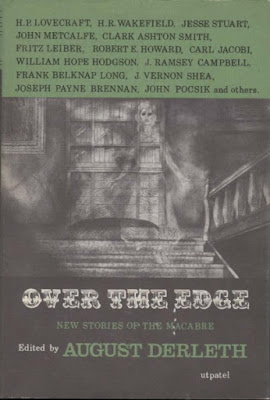by Ramsey Campbell
originally published Over The Edge, Arkham House, 1964
Michael Nash is a young nerd who works at (apparently) the tax office. He lives with his dad, a respected medical man who sidelines as an occult researcher. And it seems Mike's been through dad's library as well.
One night Michael gets home to find pops dead, an apparent suicide. He also has a letter for Michael, warning him not to pursue these paths of research, especially re: an island off Severnford which holds some sinister secret that's driven him to this self-inflicted exit.
Michael, of course, defies his dad's dying wishes and immediately jumps into pops' notes on the island, a series of anecdotes going back over 100 years … remains of a Roman temple, mysterious stones, and people who go there reporting seeing fluttering things which shine in the moonlight, and almost all of whom seem to end up dead - mutilated.
Naturally, Michael rents a boat and heads out there. He finds the island unsettling, and spots a white, spherical stone which sends a cold shock through him when he touches it. Disturbed, he leaves. Arriving home, he spots a face peering at him from between some curtains. He swings a poker at what he assume will be the body of the intruder, but only succeeds in breaking the window. The face, which is apparently independent of any body, flutters out the window.
The face continues to haunt him, floating around windows at his workplace. Even worse, it brings friends. Even worse, only he can see the floating faces. After a few days of this, Michael's getting a little jumpy. One afternoon while retrieving some forms from a basement room, he sees one of the faces and viciously attacks it, only to find he's actually injured or possibly killed a co-worker. He flees, wandering around town until he finally confronts the faces, and is later found dead, mutilated, his own face removed.
This is an odd one. Written just after The Inhabitant of the Lake, it is Campbell attempting to find his own voice and settings, and modeled not on HPL but M.R. James - and structurally it does indeed resemble a James tale. It's quite minor, but it was an important story for Campbell.



No comments:
Post a Comment